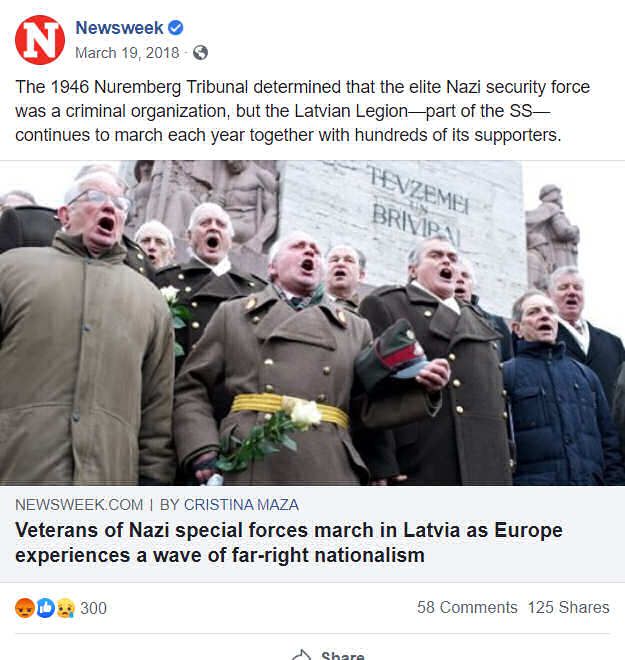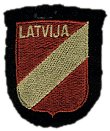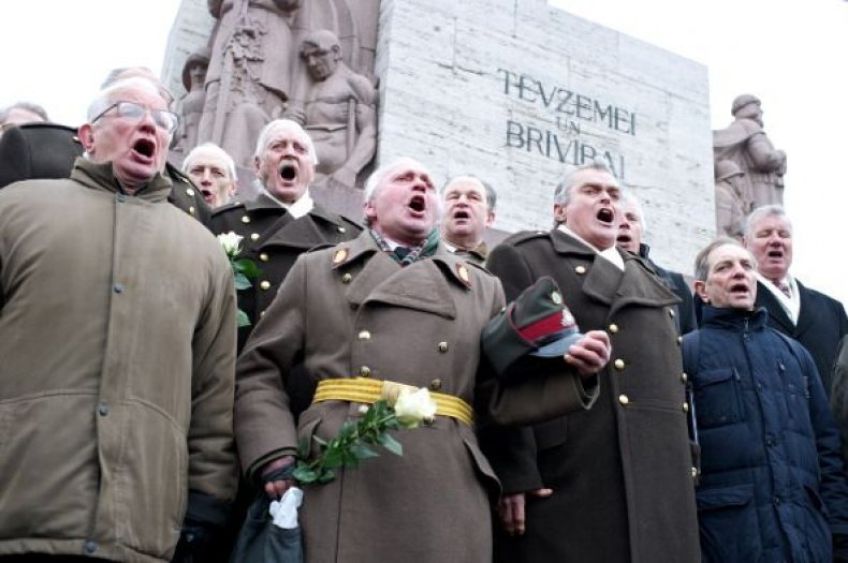1VETERANS OF WORLD WAR II-ERA NAZI SS SPECIAL FORCES MARCH IN LATVIA AS EUROPE EXPERIENCES WAVE OF FAR-RIGHT NATIONALISM
By Christina Maza
Police in Latvia arrested a man participating in a 2pro-Nazi march on Friday morning because he was carrying a poster with an image of soldiers killing Jews.
The annual Remembrance Day of the Latvian Legionnaires brings together 3veterans of two divisions of the World War II-era German Waffen-SS, which was the armed wing of the Nazi Party's SS, or Schutzstaffel, which literally means "protection squadron." 4The 1946 Nuremberg Tribunal determined that the elite Nazi security force was a criminal organization, but the Latvian Legion — part of the SS — continues to march each year together with hundreds of its supporters. It is the only public event in Europe that honors former Nazis.
This year’s event took place 5amid growing concerns about far-right, nationalist and pro-Nazi sentiment in Europe. In particular, nearby Poland saw neo-Nazis and other far-right elements march to celebrate the 99th anniversary of Polish independence in November last year. Still, experts said that far-right movements are becoming less prominent in the Baltic region, where Latvia is located.
“While the upsurge of far-right movements in Europe, including in the Baltic States, is a worrying new development, particularly for minorities like asylum seekers and Roma who tend to fall between the crosshairs, 6the number of far-right participants in marches such as this has fallen year-on-year in the Baltic,” Nathan Stormont, a researcher at Freedom House, told Newsweek.
“Such movements tend to become the butt of online jokes rather than a meaningful force on the Latvian political scene,” Stormont added.
7The Latvian Legion formed during World War II when Baltic countries such as Latvia 8found themselves stuck between the German forces and the Soviet Union. Latvia was briefly occupied by the Soviet army in 1940, shortly after Germany and the Soviet Union signed a short-lived non-aggression pact.
But the Nazis eventually invaded Latvia during their march towards the Soviet Union. Having experienced horrific violence and repression under communist leader Joseph Stalin’s rule, 9some Latvians treated the Nazis like liberators. Thousands joined the Nazis as volunteers, and many were responsible for the brutal murder of Jews in Latvia.
Over two decades after Latvia gained its independence from the Soviet Union, tensions still exist between Latvian nationalists and pro-Russian elements in the country. Veterans of the Latvian Legions laid wreaths in the country’s capital on Friday, as they were accompanied by Latvian nationalist groups.
Examination
Maza's headline evokes the image of jack-booted fascists goose-stepping across Latvia. In truth, the sacrifices of the Latvian Legion "Waffen-SS" have been solemnly commemorated since 1952. Only after independence was restored was such public recognition possible in Latvia. The Latvian Waffen-SS were combat units on the Eastern Front fighting to prevent Soviet re-occupation as a first step to restoring freedom after the war. They had absolutely no relation to Hitler's elite "Nazi SS special forces." Nor is the annual commemoration in any way associated with the genuine rise of ultra-nationalism and neo-fascism in Europe and Russia.
The annual Legion commemoration in Latvia is a procession, not march, honoring those who fought and died for Latvia's freedom — and categorically not pro-Nazi. Nor, as already noted, does commemorating the Legion have any relationship to the rise of neo-Nazism elsewhere. It is utterly irresponsible to associate a commemoration which has been going on for (as of now) seventy-two years since 1952 with current neo-fascist movements.
Anyone can read in Wikipedia that the Waffen-SS were the military arm of the Nazi party. Indeed, they grew so powerful that even the Wehrmacht feared them. Those elite Waffen-SS, of pure Aryan blood, 20/20 vision, and cavity-free teeth — part of enlistment requirements, are completely unrelated to the Waffen-SS the Nazis mobilized in occupied countries to fight on the Eastern Front.
Continuing from above, the Baltic Waffen-SS were determined to not be the same as the criminal Waffen-SS convicted at Nuremberg. Legionnaires most certainly were not "Nazis". On the contrary, former Latvian Waffen-SS were posted as Allied guards of some of the most notorious prisoners held at Nuremberg. Russia has popularized this "conviction" trope in its propaganda. Labeling the commemoration as the only public event in Europe that honors former Nazis is inexcusable.
Stating the commemoration takes place "amid" rising extremism in Europe leads the reader to wrongly infer that Latvia, described as the last country to publicly glorify Nazis, is the epicenter of a growing crisis.
6“the number of far-right participants in marches such as this has fallen year-on-year in the Baltic”
Contrary to just implying rising pro-Nazi Latvian sentiment, Maza now indicates pro-Nazi support is falling in Latvia, even noting further on that far-right movements are a subject of ridicule.
Maza's wording suggests the Legion somehow arose spontaneously in response to foreign aggression, or that Latvians may even have been in charge. Neither was the case.
30,000 Soviet troops were already stationed on Latvia's soil before WWII broke out.1 Latvia spent the war under Soviet or Nazi domination and occupation. Latvians had no possibility for independent action. "Between" ceased being an appropriate description once Hitler and Stalin launched WWII as allies.
Maza fails to differentiate between those the Nazis enlisted as Holocaust collaborators, and those mobilized on the Eastern Front. Far more Latvians volunteered to pursue the retreating Red Army — seeking revenge for family and friends mass-deported only a week earlier or killed during a year of brutal occupation than colluded in the Holocaust. Even Gustavs Celmiņš, the leader of the pre-war fascist Latvian Pērkonkrusts party lobbied to form Latvian military units to pursue the Red Army, not to murder Jews in the Holocaust.
Shortly after the Nazi occupation commenced, a "recruiting reserve" was formed to train and send combat units to the Eastern Front. Those who volunteered to fight the Soviets, including pre-Legion "police battalions" subordinated to the Wehrmacht, shared no sympathies, alliances, or relationship with Holocaust collaborators, that is, those subordinated to the Sicherheitsdienst ("SD").
Words such as "volunteer" and "many" allow the imagination to run wild. The numbers:
- Arājs Kommando, the most notorious collaborator unit, 300-500 during the Holocaust in Latvia, over 1,000 later in Byelorussia and elsewhere west of Latvia
- Collaborator auxiliaries acted mostly as guards, but also included the Rīga Prefecture under a Latvian SD collaborator the Nazis brought to Latvia from Berlin; the vast majority of police battalions had no role in the Holocaust
- Mobilized on the Eastern Front, 110,000, estimates range from 100,000 to 140,000, not involved in the Holocaust; these included police battalions at the front, which were later incorporated into the Latvian Legion; 85% of the Legion was conscripted
- Conscripted by the Red Army, at least another 100,000
Some were captured or conscripted by both sides. Latvians facing Latvians on the battlefield refused to engage.
Behind the headline
Christina Maza is a free-lance journalist and Eastern Europe & Eurasia watcher. Excerpting from her web site:
I frequently write about foreign policy, international affairs, national security, and politics.
I am especially interested in explaining complex subjects — including conflicts, migration matters, disinformation campaigns, corruption, and foreign influence on politics — for a general audience. I never pass up the opportunity to tell a good story, and I always strive to cover underreported issues, events, places, and communities....
A graduate of the University College London School of Slavonic and East European Studies,.... I speak English, Spanish, and Serbo-Croatian, and I’m always working to improve my Russian language skills.
The emphasis is ours. It's not clear whether to be puzzled, disappointed, or both, comparing Maza's journalistic interests and education to this piece she wrote for Newsweek. For those not familiar with Latvian history (most people), the contention that someone wearing their German-issued WWII uniform in an annual commemoration is not glorifying Nazism can be confusing. Unfortunately, Maza offers a simplistic and false rendition of the facts. Among the issues? As noted above, the Latvian Legion were not "Nazi SS Special Forces", nor were they convicted as war criminals at Nuremberg.
This left us wondering, what could Maza have been taught at University College London (UCL)? Who taught her? Was she subjected to ideologically slanted pedagogy? From the UCL School of Slavonic and East European Studies (SSEES) site:
We are one of the UK's largest institutions for research and teaching on Russia, the Baltics, and Central, Eastern and South-East Europe.
The UCL site supports searching for faculty to engage on topics in their area of expertise, and provides two matches for the "Baltic states":
- Richard Mole, Professor of Political Sociology — browsing through Mole's The Baltic States from the Soviet Union to the European Union2, his accounts of the Latvian Legion Waffen-SS are largely objective and accurate.
- Dr. Allan Sikk, Associate Professor — has written a multitude of papers focusing on political parties and affiliations in the Baltics and Latvia. His 2006 doctoral thesis at the University of Tartu, Highways to Power: New Party Successes in Three Young Democracies [Estonia, Latvia, and Lithuania] makes for dry but detailed and informative reading on political affiliations and parties, election finances, and the electorate.
There is no reason to suspect Maza's education misled her. If Maza is unaware that the Legion has been commemorated since 1952, one can see how she could mistakenly conflate the false accusation of Latvian Nazism — believing the commemoration instituted in Latvia was established only in 1998 instead of being a change in status — with the real rise of neo-Nazism and fascist-leaning nationalism in central eastern Europe and Russia. But she also sensationalizes the annual commemoration with false allegations. We would prefer to believe Maza did not seek attention for her authorship at the expense of historical accuracy. The only other conclusion is that she was misled by a slew of false accusations. Unfortunately, Maza invokes the "Nazi" epithet instead of dissecting and explaining a "complex subject". Or perhaps she believes the subject is simple: that Latvians really are Nazi-lovers and Nazis.
It is unfortunate to witness Maza herself become part of a disinformation campaign. For evidence, one need only access Newsweek's posting announcing the article on Facebook. It leads with the false statement that the Latvian Legion were part of the criminal "elite Nazi security force" convicted at Nuremberg.
We sent this review to Ms. Maza on March 22, 2020 and invited her response. If she replies, we will share it per her instructions, if any. As of November, 2020, we have received no reply.
 Newsweek's Facebook post
Newsweek's Facebook post| 1 | Stalin extorted the Baltic states to sign "protection" pacts under threat of invasion. These agreements permitted the USSR to establish military bases on the Baltic states' territory for the duration of the war and to station 25,000 troops in Estonia, 30,000 in Latvia and 20,000 in Lithuania. |
| 2 | Mole, R.C.M.. The Baltic States from the Soviet Union to the European Union: Identity, Discourse and Power in the Post-Communist Transition of Estonia, Latvia and Lithuania, Routledge, 2012, ISBN: 9780415394970. LINK |

